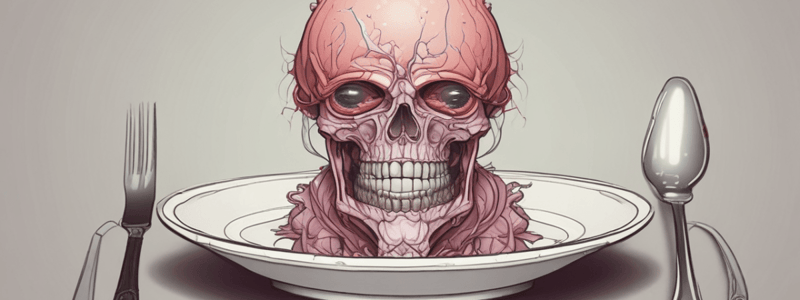Podcast
Questions and Answers
Which of the following is a characteristic symptom of Bulimia Nervosa?
Which of the following is a characteristic symptom of Bulimia Nervosa?
- Recurring episodes of binge eating (correct)
- Appetite loss
- Eating non-food substances
- Restrictive eating patterns
What is a potential physical consequence of Pica Disorder?
What is a potential physical consequence of Pica Disorder?
- Infections (correct)
- Dehydration
- Electrolyte imbalances
- Malnutrition
Which of the following is NOT a symptom of Bulimia Nervosa?
Which of the following is NOT a symptom of Bulimia Nervosa?
- Secretive eating habits
- Restrictive eating patterns (correct)
- Purging behaviors
- Appetite loss
What is a characteristic feature of Pica Disorder?
What is a characteristic feature of Pica Disorder?
Which of the following physical consequences is shared by both Bulimia Nervosa and Pica Disorder?
Which of the following physical consequences is shared by both Bulimia Nervosa and Pica Disorder?
What is a common emotional consequence of Bulimia Nervosa?
What is a common emotional consequence of Bulimia Nervosa?
Which of the following is a potential complication of Pica Disorder?
Which of the following is a potential complication of Pica Disorder?
What is a key distinction between Bulimia Nervosa and Pica Disorder?
What is a key distinction between Bulimia Nervosa and Pica Disorder?
What is the primary characteristic of Anorexia Nervosa?
What is the primary characteristic of Anorexia Nervosa?
Which of the following is a physical consequence of Binge Eating Disorder?
Which of the following is a physical consequence of Binge Eating Disorder?
What is a type of psychological therapy used to treat eating disorders?
What is a type of psychological therapy used to treat eating disorders?
What is the definition of Bulimia Nervosa?
What is the definition of Bulimia Nervosa?
What is a symptom of Anorexia Nervosa?
What is a symptom of Anorexia Nervosa?
What is a treatment option for eating disorders?
What is a treatment option for eating disorders?
What is a physical consequence of Anorexia Nervosa?
What is a physical consequence of Anorexia Nervosa?
What is the primary motivation behind the restrictive eating patterns in Anorexia Nervosa?
What is the primary motivation behind the restrictive eating patterns in Anorexia Nervosa?
Which of the following is a key difference between Binge Eating Disorder and Bulimia Nervosa?
Which of the following is a key difference between Binge Eating Disorder and Bulimia Nervosa?
What is the primary goal of nutrition counseling in the treatment of eating disorders?
What is the primary goal of nutrition counseling in the treatment of eating disorders?
Which of the following is a potential complication of Pica Disorder?
Which of the following is a potential complication of Pica Disorder?
What is a common psychological symptom of Anorexia Nervosa?
What is a common psychological symptom of Anorexia Nervosa?
Which of the following treatment options is most effective for severe cases of eating disorders?
Which of the following treatment options is most effective for severe cases of eating disorders?
What is a characteristic feature of Binge Eating Disorder?
What is a characteristic feature of Binge Eating Disorder?
Which of the following is a psychological symptom of Bulimia Nervosa?
Which of the following is a psychological symptom of Bulimia Nervosa?
What is the primary focus of Cognitive-behavioral therapy (CBT) in the treatment of eating disorders?
What is the primary focus of Cognitive-behavioral therapy (CBT) in the treatment of eating disorders?
Which of the following is a potential consequence of untreated eating disorders?
Which of the following is a potential consequence of untreated eating disorders?
Flashcards are hidden until you start studying
Study Notes
Anorexia Nervosa
- Definition: A serious eating disorder characterized by a distorted body image and an intense fear of gaining weight, leading to restrictive eating habits and significant weight loss.
- Symptoms:
- Restrictive eating patterns
- Significant weight loss
- Fear of gaining weight
- Distorted body image
- Denial of the existence of a weight problem
- Physical consequences:
- Malnutrition
- Osteoporosis
- Hair loss
- Cold intolerance
- Heart problems
Binge Eating Disorder
- Definition: A type of eating disorder characterized by recurring episodes of binge eating, which can lead to feelings of guilt, shame, and weight gain.
- Symptoms:
- Recurring episodes of binge eating
- Eating large amounts of food in a short time
- Feeling a lack of control during binge episodes
- Feeling guilty or ashamed after bingeing
- Physical consequences:
- Weight gain
- High blood pressure
- High cholesterol
- Diabetes
- Sleep apnea
Treatment Options
- Psychological therapies:
- Cognitive-behavioral therapy (CBT)
- Family-based therapy (FBT)
- Interpersonal psychotherapy (IPT)
- Medications:
- Antidepressants (e.g., fluoxetine)
- Anti-anxiety medications (e.g., benzodiazepines)
- Mood stabilizers (e.g., lithium)
- Nutritional counseling:
- Working with a registered dietitian to develop a healthy meal plan
- Learning about nutrition and healthy eating habits
Bulimia Nervosa
- Definition: A serious eating disorder characterized by cycles of bingeing and purging, which can lead to electrolyte imbalances, tooth decay, and gastrointestinal problems.
- Symptoms:
- Recurring episodes of binge eating
- Purging behaviors (e.g., self-induced vomiting, laxatives, diuretics)
- Secretive eating habits
- Shame and guilt after bingeing and purging
- Physical consequences:
- Electrolyte imbalances
- Tooth decay
- Gastrointestinal problems
- Dehydration
- Heart problems
Pica Disorder
- Definition: A eating disorder characterized by eating non-food substances, such as dirt, chalk, or paper, which can lead to gastrointestinal problems and nutrient deficiencies.
- Symptoms:
- Eating non-food substances
- Cravings for non-food substances
- No apparent medical reason for eating non-food substances
- Physical consequences:
- Gastrointestinal problems
- Nutrient deficiencies
- Infections
- Intestinal blockages
- Poisoning
Eating Disorders
Anorexia Nervosa
- Characterized by distorted body image and intense fear of gaining weight, leading to restrictive eating habits and significant weight loss
- Symptoms include restrictive eating patterns, significant weight loss, fear of gaining weight, distorted body image, and denial of weight problem
- Physical consequences include malnutrition, osteoporosis, hair loss, cold intolerance, and heart problems
Binge Eating Disorder
- Characterized by recurring episodes of binge eating, leading to feelings of guilt, shame, and weight gain
- Symptoms include recurring episodes of binge eating, eating large amounts of food in a short time, feeling a lack of control during binge episodes, and feeling guilty or ashamed after bingeing
- Physical consequences include weight gain, high blood pressure, high cholesterol, diabetes, and sleep apnea
Treatment Options
- Psychological therapies include cognitive-behavioral therapy (CBT), family-based therapy (FBT), and interpersonal psychotherapy (IPT)
- Medications include antidepressants, anti-anxiety medications, and mood stabilizers
- Nutritional counseling involves working with a registered dietitian to develop a healthy meal plan and learn about nutrition and healthy eating habits
Bulimia Nervosa
- Characterized by cycles of bingeing and purging, leading to electrolyte imbalances, tooth decay, and gastrointestinal problems
- Symptoms include recurring episodes of binge eating, purging behaviors, secretive eating habits, and shame and guilt after bingeing and purging
- Physical consequences include electrolyte imbalances, tooth decay, gastrointestinal problems, dehydration, and heart problems
Pica Disorder
- Characterized by eating non-food substances, such as dirt, chalk, or paper, leading to gastrointestinal problems and nutrient deficiencies
- Symptoms include eating non-food substances, cravings for non-food substances, and no apparent medical reason for eating non-food substances
- Physical consequences include gastrointestinal problems, nutrient deficiencies, infections, intestinal blockages, and poisoning
Eating Disorders
Anorexia Nervosa
- Restrictive eating patterns and significant weight loss or failure to gain weight
- Distorted body image and intense fear of gaining weight
- Emaciation, hair loss, cold intolerance, and fatigue
- Obsessive thoughts about food and weight, denial of the existence of a problem, and perfectionism
- Mood disturbances, such as anxiety and depression
Binge Eating Disorder
- Recurring episodes of binge eating and feeling a lack of control during episodes
- Emotional distress after episodes
- Weight gain, digestive problems, and sleep disturbances
- Shame and guilt after bingeing, emotional eating, and low self-esteem
Treatment Options
- Cognitive-behavioral therapy (CBT), family-based therapy (FBT), and psychodynamic therapy
- Meal planning and nutrition education, weight management, and nutrition counseling
- Antidepressants (SSRIs) and anti-anxiety medications
- Hospitalization and residential treatment in severe cases
Bulimia Nervosa
- Recurring episodes of binge eating and purging or compensatory behaviors
- Fear of gaining weight and distorted body image
- Electrolyte imbalance, gastric rupture, tooth decay, and gum damage
- Shame and guilt after purging, emotional eating, and low self-esteem
Pica Disorder
- Eating non-food substances, such as dirt, chalk, or paper
- Significant distress or impairment
- Gastrointestinal problems, intestinal blockages, and infections
- Anxiety and stress, impulsivity, and developmental delays (in children)
Studying That Suits You
Use AI to generate personalized quizzes and flashcards to suit your learning preferences.




